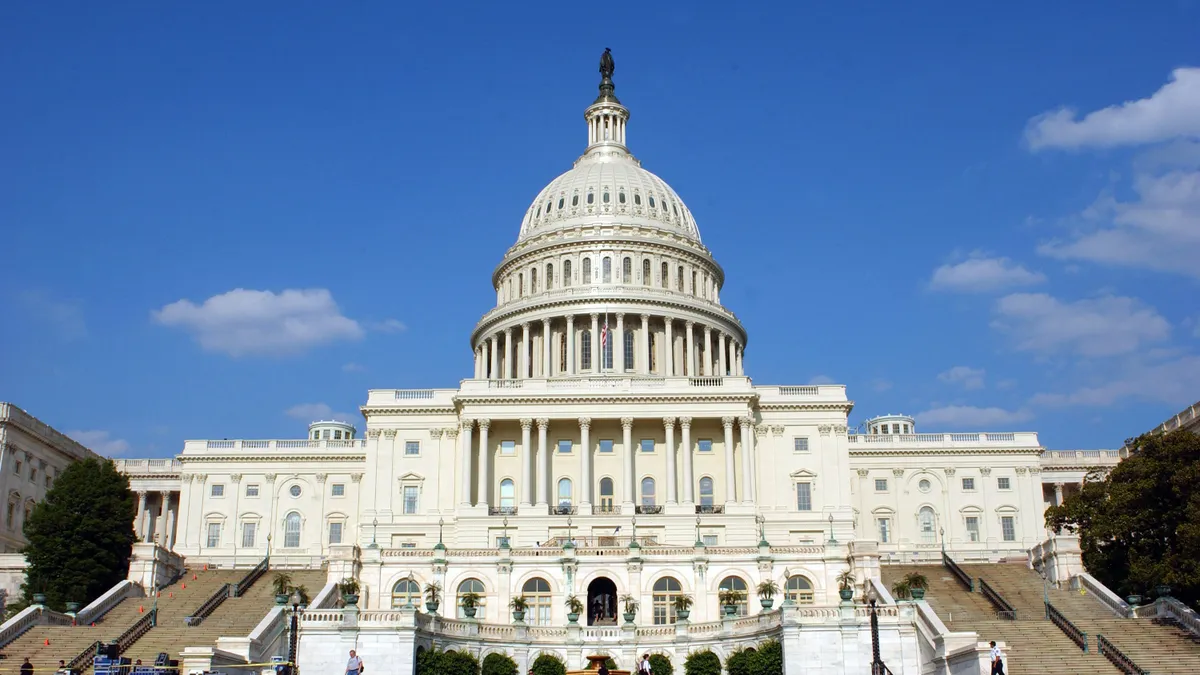Dive Brief:
- IRS Commissioner Charles Rettig told a House panel Thursday that the agency lacks the funding and resources necessary for auditing a large number of big companies that file questionable tax returns.
- “Our ability to enforce the tax laws against non-compliant taxpayers with complex returns continues to be hampered by a lack of resources,” Rettig said in testimony to a subcommittee under the House Oversight and Reform Committee. “We can no longer audit a respectable percentage of large corporations, and we are often limited in the issues reviewed among those we do audit.”
- “These corporations can afford to spend large amounts on legal counsel, drag out proceedings and bury the government in paper,” Rettig said in written testimony to the subcommittee on government operations. “We are, quite simply, outgunned in our efforts to assure a high degree of compliance for these taxpayers.”
Dive Insight:
The Biden administration last month proposed raising the IRS budget by 18.3% to $14.1 billion for fiscal year 2023. The higher funding would help offset a more than 15% decline in the agency’s budget during the past decade after inflation.
The White House has proposed $463.3 million in IRS enforcement spending to help increase the audit rate, which since 2010 has declined by half for returns filed by large corporations, pass-through entities and high-wealth individuals, the IRS said.
The higher spending on enforcement — including examination, collection and investigation — will “ensure fairness in the tax system and narrow the tax gap,” or the amount owed but not paid, Rettig said.
The current annual tax gap is roughly $400 billion, Rettig said, noting that the IRS generates $5 for every $1 spent on enforcement, “not including significant deterrence effects.”
Faced with limits in enforcement funds and staff, “we are forced to make difficult decisions regarding priorities, the types of enforcement actions we employ and the service we offer,” Rettig said.
For example, IRS shortages constrain its ability to implement the Foreign Account Tax Compliance Act enacted by Congress in 2010, he said. The agency needs funding to train specialists in tracking cross-border money flows.
“They will help ensure tax compliance by improving our capacity to detect unreported accounts and income generated by those accounts, as well as the sources of assets in offshore accounts,” Rettig said.
“In other programs we have information but are unable to select all high-risk cases identified due to resource and funding constraints,” he said.
The IRS for decades has operated on tight budgets that have hampered efforts at enforcement, processing tax returns and replacing technology that dates to the 1960s.
Since 2010 the agency’s workforce has shrunk 17% even as its workload — based on the number of filings — has increased 19%, Erin Collins, National Taxpayer Advocate, said in written testimony to the subcommittee.
With insufficient resources, IRS employees last year answered only 11% of taxpayer phone calls, Collins said. Also, “IT systems are antiquated and are largely held together by belt and suspenders, currently unable to offer taxpayers seemingly basic features like effective online accounts.”
IRS responsibilities increased during the pandemic as the agency took the lead in distributing federal aid through tax credits and checks.
The IRS faced “multiple challenges during the 2021 filing season as it struggled to respond to an unprecedented workload,” the Government Accountability Office said in a report this month. In-person service fell, online refund information was limited and tax refunds lagged for millions of taxpayers.
The agency’s backlog of unprocessed tax returns and correspondence has surged. As of April 8, the IRS needed to manually process 20.9 million tax returns and about 5.3 million pieces of correspondence with taxpayers, Collins said.
Difficulties at the IRS have provoked partisan rancor that flared during the hearing, focused primarily on efforts to increase the agency’s budget.
Lawmakers need to “look at how decades of deliberate starvation of the IRS by the Congress can be countered with robust appropriations and new hiring flexibilities,” Rep. Gerry Connolly, D-Va., said at the start of the hearing.
“The severe financial, technical and staffing problems at the IRS were predictable and a direct result of years of partisan hostility here in Congress, reckless investigations and unwarranted budget cuts,” said Connolly, chairman of the subcommittee.
Democrats should not count on Republicans to approve greater IRS funding, Rep. Jody Hice, R-Ga., told the subcommittee.
“Republicans are not willing to simply give the IRS more money on a long-term basis without any accountability,” said Hice, the subcommittee’s ranking member. “It seems my Democratic friends just simply want to continue throwing money into a black hole.”














